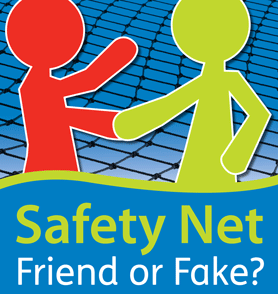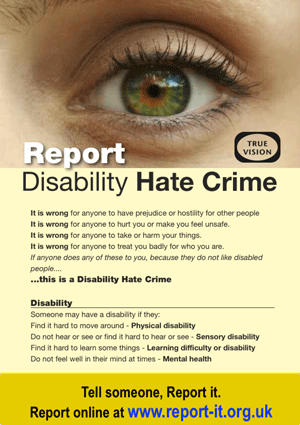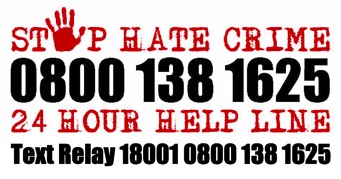How do you know when a friend is really a friend?
Most friends really are friends… but sometimes people might pretend to be your friend. People who commit Mate Crimes might be nice to your face. These people are often not rude, violent or aggressive, nor do they steal your things. They pretend to be nice to you.
- Mate Crime does not start with bullying but it can become bullying.
- It starts with people saying they are your friend.
- Mate Crimes often happen in private and are not seen by others.
- Mate Crimes are Disability Hate Crimes and should be reported to the Police.
All of these might be a Disability Hate Crime:
- Kids throwing stones at my window.
- Someone borrowing my mobile and using up all the credit.
- A group of people beating me up outside the local shops and stealing my shopping.
- My mate coming round every time it’s my benefit day so we can go to the pub and spend my money.
- Family members taking my money from me without asking.
- My friend comes round every Thursday and we go out in his car for the afternoon. He only charges me 20 quid for petrol each time.
- My neighbour calling me names when she sees me.
- People sending abusive text messages to my mobile phone.
- My mates always come to my flat for a party on a Friday night – I don’t mind getting the food and drink in for them.
- My boyfriend saying I should have sex with other men for money.
How can you spot Mate Crime?
These are the signs you need to look out for. If you notice any of these things it could mean the person is a victim of Mate Crime.
- Changes in routine, behaviour, appearance, finances or household (e.g. new people visiting or staying over, lots of new ‘friends’, lots more noise or rubbish than there normally is).
- Unexplained injuries.
- Being involved in sexual acts which they have not agreed to.
- Losing weight.
- Not taking care of themselves and looking dirty or scruffy.
- Bills not being paid.
- A ‘friend’ who does not respect, bullies or undermines the person.
- Suddenly short of money, losing possessions or changing their will.
- The person ‘doing what they are told to’ by a ‘friend’.
- Showing signs of mental ill health.
- Not being with usual networks of friends/family or missing weekly activities.
- Goods or packages arriving at a person’s house (and then being collected by someone else soon after).
- The house is a mess after lots of parties.
The above has been taken from the Friend or Fake Easy Read Guidance Booklet.








